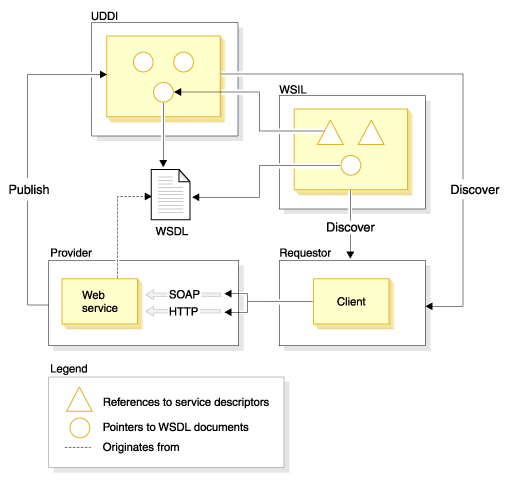One of the key attributes of Internet standards is that they focus
on protocols and not on implementations. The Internet is composed of heterogeneous
technologies that successfully interoperate through shared protocols. This
prevents individual vendors from imposing a standard on the Internet. Open
Source software development plays a crucial role in preserving the interoperability
of vendor implementations of standards.
The following standards play key roles in Web services: Universal Description,
Discovery and Integration (UDDI), Web Services Description Language (WSDL),
Web Services Inspection Language (WSIL), SOAP, and Web Services Interoperability
(WS-I). The relationship between these standards is described in Figure 2.
The UDDI specification defines open, platform-independent standards that
enable businesses to share information in a global business registry, discover
services on the registry, and define how they interact over the Internet.
For more information on UDDI, refer to
www.uddi.org
WSIL is an XML-based open specification that defines a distributed service
discovery method that supplies references to service descriptions at the service
provider's point-of-offering, by specifying how to inspect a Web site for
available Web services. A WSIL document defines the locations on a Web
site where you can look for Web service descriptions. Since WSIL focuses
on distributed service discovery, the WSIL specification complements UDDI
by facilitating the discovery of services that are available on Web sites
that may not be listed yet in a UDDI registry. A separate topic in this
documentation discusses the
Relationship between UDDI and WSIL. For more information on WSIL, refer to
www.ibm.com/developerworks/webservices/library/ws-wsilspec.html
WSDL is an XML-based open specification that describes the interfaces to
and instances of Web services on the network. It is extensible, so endpoints
can be described regardless of the message formats or network protocols that
are used to communicate. Businesses can make the WSDL documents for their
Web services available though UDDI, WSIL, or by broadcasting the URLs to their
WSDL via email or Web sites. WSDL is described as a separate topic in this
documentation. For more information on WSDL, refer to
www.w3.org/TR/wsdl
SOAP is an XML-based standard for messaging over HTTP and other Internet
protocols. It is a lightweight protocol for the exchange of information in
a decentralized, distributed environment. It is based on XML and consists
of three parts:
- An envelope that defines a framework for describing what is in a message
and how to process it.
- A set of encoding rules for expressing instances of application-defined
data types.
- A convention for representing remote procedure calls and responses.
SOAP enables the binding and usage of discovered Web services by defining
a message path for routing messages. SOAP may be used to query UDDI for Web
services. For more information on SOAP 1.1 (SOAP 1.2 is not supported by the
Web services tools), refer to
www.w3.org/TR/SOAP
Figure 2. Relationships between SOAP, UDDI, WSIL and WSDL.

A service provider hosts a Web service and makes it accessible using protocols
such as SOAP/HTTP or SOAP/JMS. The Web service is described by a WSDL document
that is stored on the provider's server or in a special repository. The WSDL
document may be referenced by the UDDI business registry and WSIL documents.
These contain pointers to the Web service's WSDL files.
The WS-I Simple SOAP Binding Profile and WS-I Attachments Profile are outlines
of requirements to which WSDL and Web service protocol (SOAP/HTTP) traffic
must comply in order to claim WS-I conformance. The Web services WS-I validation
tools currently support WS-I Simple SOAP Binding Profile 1.0 and the Attachment
Profile 1.0. To view the specifications, refer to the WS-I Web site, and under
Resources select Documentation:
https://www.ws-i.org
Several new Web services standards are also supported by this development
environment. These include:
- JAX-RPC
- JAX-RPC stands for Java™ API for XML-based RPC, also known as
JSR 101. It is a specification that describes Java Application Programming Interfaces
(APIs) and conventions for building Web services and Web service clients that
use remote procedure calls (RPC) and XML. It standardizes the Java to
WSDL and WSDL to Java mappings, and provides the core APIs for developing
and deploying Web services and Web service clients on the Java platform.
For more information refer to the
official specifications.
- JSR-109
- JSR-109 (Implementing Enterprise Web Services) defines the programming
model and run-time architecture to deploy and look up Web services in the
Java EE environment; more specifically, in the Web, EJB, and Client Application
containers. One of its main goals is to ensure vendors' implementations interoperate.
For more information, refer to the official specifications:
- WS-S
- These tools support the OASIS Web Services Security 1.0 standard. For
more information on the various components of this standard, refer to:
Web services tooling supports the following specifications:
| Technology or specification |
Version or level supported |
|
Transports
|
| HTTP/HTTPS |
v1.0 and v1.1 |
| JMS |
|
|
Messaging
|
| SOAP specification |
v1.1 |
| SOAP Attachements |
|
|
Description
|
| UDDI |
v2.0 |
| WSDL |
v1.1 |
| WSIL |
v1.0 |
|
Security
|
| WS-Security |
OASIS Standard 1.0 |
|
Ineroperability
|
| WS-I Basic Profile |
1.1.2 |
| WS-I Simple SOAP Binding Profile |
1.0.3 |
| WS-I Attachments Profile |
1.0 |
|
Other Standards
|
|
| JAX-RPC |
v1.0 for J2EE 1.3, v1.1 for J2EE 1.4 and Java EE 1.5 |
| JSR 109 |
|
